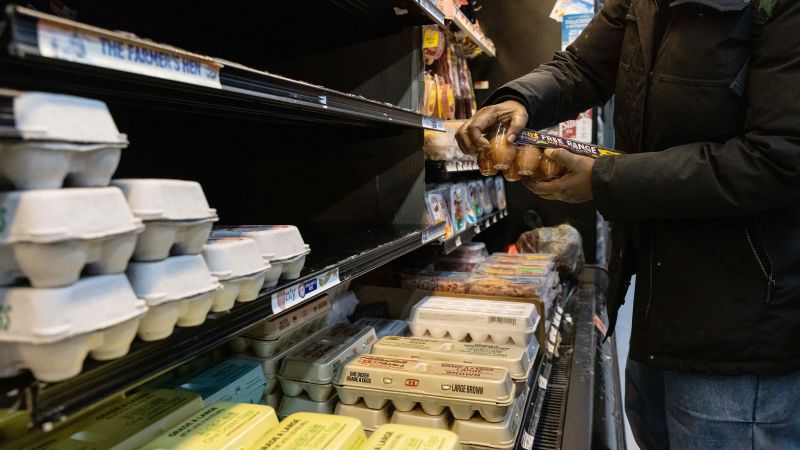On her inaugural day in office, U.S. Department of Agriculture Secretary Brooke Rollins convened a meeting focusing on the agency’s strategies to tackle the ongoing bird flu crisis, a matter that has critical implications for the poultry industry and egg prices across the nation. The bird flu outbreak, identified as highly pathogenic avian influenza, has severely disrupted poultry production, making the cost of eggs skyrocket. For many households, the price of eggs has become a significant strain on budgets as it witnessed its steepest increase in many years.
During an additional gathering last week, Secretary Rollins engaged with a group of approximately two dozen farmers. This meeting was essential for Secretary Rollins to understand their perspectives on the challenges posed by the bird flu. She reassured them that her administration is committed to implementing relief measures to combat the ramifications of this outbreak. The urgency of the situation has been emphasized by Rollins, who acknowledged that rectifying the issues caused by the outbreak will not happen overnight but requires aggressive action to support poultry farmers and restore affordability in egg prices.
In this climate, economic analysts have placed much of the blame for rising grocery costs squarely on the poultry sector, particularly eggs. Data from the Consumer Price Index indicated that from December to January, grocery prices surged at an unprecedented pace not seen in over two years, largely driven by escalating egg prices. The prices predicted by the USDA threaten to increase by more than 20% in the coming year if preventive measures fail to bridge the gap.
Avian influenza has emerged as a significant threat to both commercial poultry operations and small-scale backyard flocks in the United States, with egg-laying hens suffering the brunt of the outbreak. The National Chicken Council has reported that out of more than 162 million poultry assets impacted by the virus, over 77% are egg-laying hens. The existence of the virus amongst wild bird populations plays a crucial role, as outbreaks in domestic birds frequently stem from wild birds that serve as carriers. Traditional strategies to contain the virus have included strict biosecurity protocols and euthanizing infected flocks. Experts argue that maintaining immunity through vaccines has not developed into the primary focus of containment strategies.
Dr. Matt Koci, an expert in poultry science at North Carolina State University, has articulated that while the U.S. has effectively dealt with previous outbreaks, the current level of infection is alarming, leading to fears that the virus may now be a permanent resident in the environment. The current outbreak is causing domestic birds to present symptoms of illness within days, resulting in drastic measures for flock management. Monitoring has revealed that in just the last month, 134 commercial and backyard flocks have reported bird flu cases, impacting nearly 19 million birds. American farmers are mandated to report any suspected infections, and swift culling of infected birds is enforced to prevent the broader spread of the virus.
The Trump era’s agricultural policies, particularly the culling strategy, continue to spur debate, as current administration officials, including National Economic Council Director Kevin Hassett, seek additional strategies beyond culling to combat the ongoing crisis. Meanwhile, conventional methods to strengthen biosecurity are in place, but skeptics argue that there are always areas left for improvement.
While several medications are under development, the consensus in the industry remains that culling presents one of the only effective methods for containing spread and damage. As highlighted by experts in the field, similar to wildfire management, if a containment strategy isn’t swiftly implemented, it risks spreading completely out of control, adversely impacting larger agricultural sectors and the economy.
The debate surrounding vaccination against avian influenza has also re-emerged. Many in the poultry industry are cautious of any vaccination strategy, wary of its impact on U.S. poultry exports, which represent a major economic sector. The National Chicken Council has accentuated the importance of maintaining free trade agreements by opposing the vaccination strategy on grounds that it could jeopardize international sales.
As concerns grow regarding the symptomology of the virus among various species, including the alarming rise of infections in dairy cows, industry leaders and scientists are navigating a complex landscape while balancing economic pressures and health policy measures. Vaccination efforts abroad have yielded promising results, yet the U.S. remains conservative in adopting widespread vaccination strategies.
In summary, the avian influenza outbreak presents multifaceted challenges that demand coordinated efforts between government, scientists, and farmers to stabilize the poultry ecosystem, ensure food affordability, and protect public health, particularly amidst a climate of evolving global health threats.



